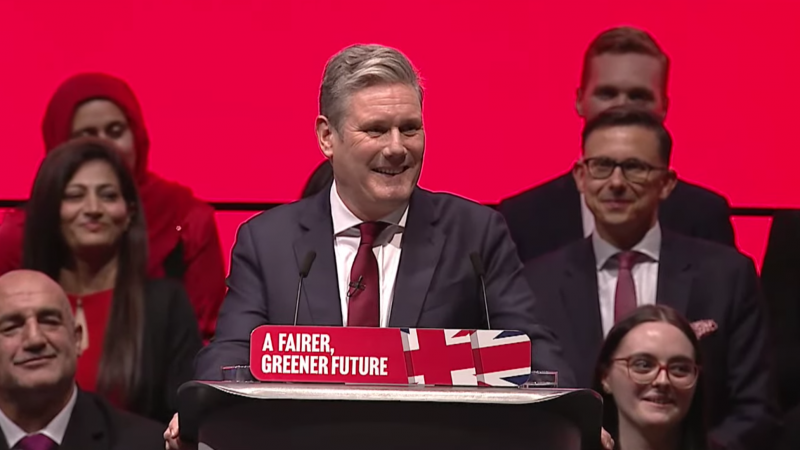
Coming the week after the Tories pledged to resume fracking, Labour’s plans for a publicly owned energy company have been widely welcomed, with parts of the left triumphant at putting public ownership back on the agenda. But beneath the shift in tone, Labour’s proposal fails to understand the deeper causes of the energy crisis, leaves in place the vast majority of Margaret Thatcher’s energy privatisations and is unlikely to deliver significant savings for the public. It also falls drastically short of what is needed to manage the climate emergency.
Coupled with a commitment to decarbonise the electricity system completely by 2030 and pitched as a response to the energy bill and climate crises, Great British Energy (GBE) would invest in new renewable energy generation alongside the private sector. With rising wholesale gas prices underpinning skyrocketing energy bills, this would reduce reliance on gas by helping to increase the supply of renewable energy.
Leaving aside the long-term nature of this solution to what is a very immediate problem (fuel poverty is likely to remain in excess of the 6.7 million households reached in April this year), it is not clear that increased renewable generation will translate into lower bills.
Many energy supply companies are also involved in energy generation: making enormous profits throughout the energy crisis thanks to higher wholesale prices being passed on to customers. Generation and supply are, however, separated by a series of markets, guaranteeing that the prices we pay are determined by demand and supply at an international level. Simply inserting an additional generation company leaves this dysfunctional system intact.
In contrast with the TUC’s proposal to also establish “public ownership within the customer-oriented parts of the energy system”, GBE will have no way of directly affecting bills, and an operator on its scale is unlikely to have much impact on wholesale prices.
Worse still: in Britain’s wholesale electricity market, the most expensive generator – gas – sets the price, as energy Professor Michael Grubb has explained, with households and businesses paying far more for their electricity than what it costs to generate it from renewable sources. Additional renewable generation, while leaving the privatised supply and wholesale market untouched, will not change this.
While the wholesale price of energy has driven up bills, it still accounts for only 51% of a dual (electricity and gas) household bill. 11% of household bills pays for the profits and running costs of energy supply companies and 18% for companies responsible for transmission and distribution. These aspects are will remain in private hands under Labour, despite record profits made by transmission and distribution companies during the crisis. Distribution networks enjoy the highest profit margins of any sector in Britain and use household bills to pay out billions in dividends and interest on intercompany loans. National Grid reported a 19% increase in pre-tax profits from 2020 to 2021, while earnings per share increased from 36.3p to 46.3p. The flipside of this profiteering is poor investment and infrastructure quality.
Starmer rightly asked why the private sector should be the main beneficiaries from the carbon transition, as they were from North Sea oil. But GBE will have little opportunity to change this given its limited scale, the need to establish itself in a large private-dominated market, and a likely mandate to undertake riskier new investments, effectively de-risking climate transition for the private sector. EdF, the French state operator with which it has been compared, is responsible for the vast majority of generation capacity as a result of its history as a state monopoly founded by nationalisation. GBE will have no such advantage.
What, then, about the climate crisis? Any additional renewable generation is not to be sniffed at but here Labour’s commitments are again woefully unambitious. The £8bn pledged for renewables projects (including but not limited to GBE) is the same amount Labour’s 2019 manifesto committed for additional wind power generation alone. The 2030 target for 100% renewable electricity is only five years earlier than the government’s current plans and ignores heat, which is much more gas dependent than electricity.
Labour published 30 by 2030 in 2019, a report written by a team of climate scientists and engineers that set out thirty recommendations to decarbonise heat and electricity at a pace they judged to be the upper limit of technical feasibility. Labour’s 2019 manifesto committed to deliver these recommendations through a £250bn ‘green transformation fund’ and an integrated and publicly-owned system of energy generation, transmission, distribution and supply, largely removing the ‘need’ for competing electricity suppliers to charge prices dictated in international markets.
Starmer’s announcement represents a huge rowing back from these commitments and a tragic wasted opportunity to take historic steps towards solving the energy and climate crises. As encouraging as it is to hear public ownership back in Labour’s lexicon, GBE falls far short of what the public and the planet need.




More from LabourList
Turning the page? Labour’s recovery in the polls show a path to 2029 victory
Restoration announce recommendations for NEC candidates
‘Factionalism at the top is weakening Labour – and handing a gift to Reform’